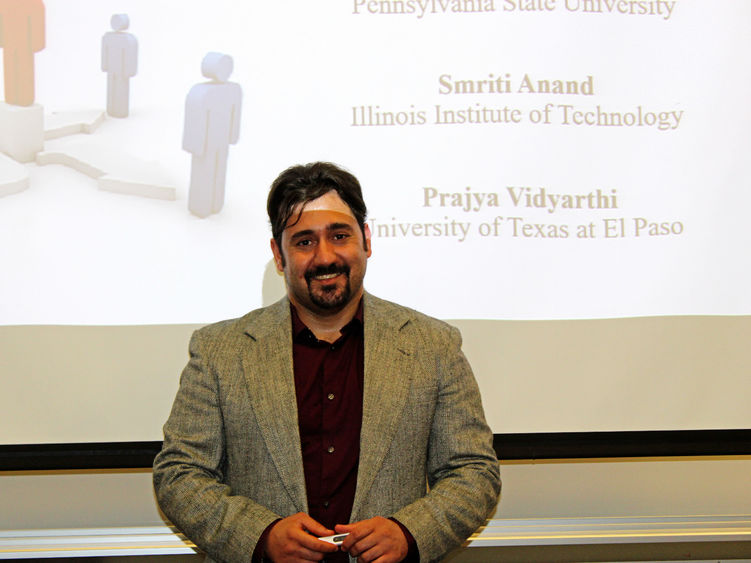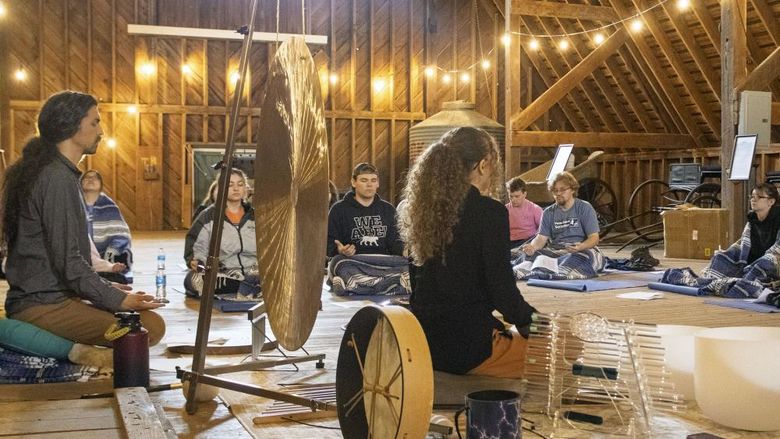
Farid Jahantab, assistant professor of business, presented his research on workplace/employee networks at the campus' Brown Bag Lunch and Learn Seminar series.
DUNMORE, Pa. — Farid Jahantab, assistant professor of business at Penn State Scranton, this semester’s first presenter for the campus' Brown Bag Lunch and Learn Seminar series, shared his research findings on workplace/employee networks.
Jahantab’s research titled, “Employee Centrality in Workgroup Social Networks and I–deals: A Test of the Ledger Model,” was done over the past two years in collaboration with Smriti Anand from the Illinois Institute of Technology and Prajya Vidyarthi from the University of Texas at El Paso. The team examined the influence of workgroup social networks on employees’ "i-deals" (idiosyncratic deals, special training and development, extended vacation time and negotiated flexible work hours).
“I always try to take an initiative when it comes to a research presentation and it feels good,” he said.
Jahantab noted that the acceptance of colleagues is critical because without their support, peers’ i-deals may not happen. Specifically, the effect of trust and hinderance network on i-deals was modeled by the three colleagues. The "trust network centrality" indicated a positive trusting relationship with an employee, while the "hinderance network centrality" indicated a negative avoidance of an employee, conveying that employees who are central on hinderance are not liked by other employees.
Within the "social ledger model" the researchers viewed social relationships as two sides of an accounting ledger: positive relationships form assets, while negative relationships form liabilities, which influence developmental opportunities. Employees who are central on hinderance are not liked by other employees. The team's research showed that negative relationships are more important than positive ones, while the hinderance network is stronger than trust network, as negative information is less ambiguous.
The most pertinent finding was that by examining both the debit and credit social ledger, it helped determine how social relationships of individuals were made. Another important finding of Jahantab and his colleagues’ research was that the negative effects of negative social networks are more detrimental than the positive effects of positive networks are functional.
Jahantab said he thinks it’s important for others to take away from his research that i-deals, like other phenomena in organizational studies, do not occur in a vacuum. Instead, they are embedded in a broader context of workgroup social networks.
He said he chose this research topic because it dates back to his industry experience.
“When I was a manager of a production plant, I developed the questions of why some employees were more likely to negotiate i-deals than others and why I, as a manager, was more likely to grant such deals to some employees but not the others,” he said. “Later on, I realized the importance of social networks on such phenomenon and decided to pursue this research topic.”
“Honestly, all parts of a research project are always enjoyable to me,” said Jahantab. “I am more comfortable with data analysis, whereas motivating participating to respond to surveys completely is probably the most challenging part to me.”
Jahantab presented two research projects at the University's BSB Colloquium Series before, but this was his first time presenting for Penn State Scranton's Brown Bag Lunch and Learn Series, a forum for faculty, students and alumni to share their research, quality improvement projects and creative works in a non-formal, non-intimidating format before presenting at a larger conference.
“I will definitely participate at this type of event as research is my passion and receiving feedback from colleagues is very fruitful,” Jahantab said.





